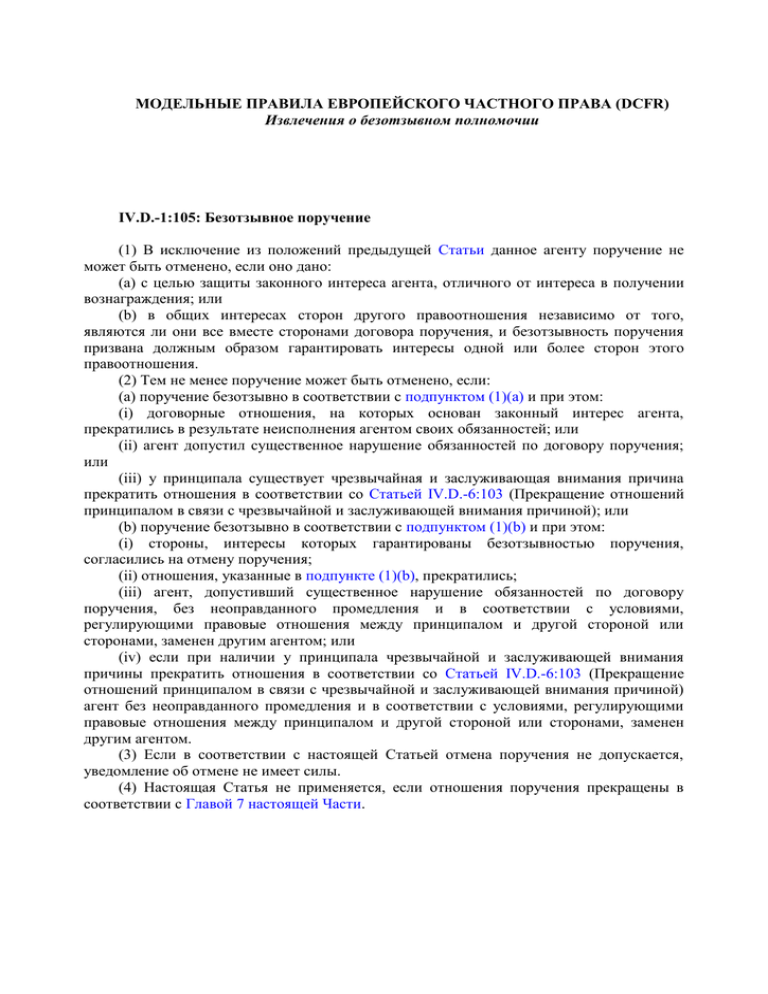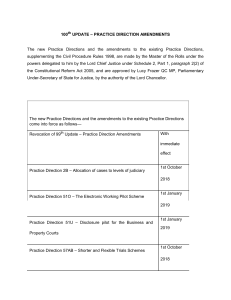МОДЕЛЬНЫЕ ПРАВИЛА ЕВРОПЕЙСКОГО ЧАСТНОГО ПРАВА
реклама

МОДЕЛЬНЫЕ ПРАВИЛА ЕВРОПЕЙСКОГО ЧАСТНОГО ПРАВА (DCFR) Извлечения о безотзывном полномочии IV.D.-1:105: Безотзывное поручение (1) В исключение из положений предыдущей Статьи данное агенту поручение не может быть отменено, если оно дано: (a) с целью защиты законного интереса агента, отличного от интереса в получении вознаграждения; или (b) в общих интересах сторон другого правоотношения независимо от того, являются ли они все вместе сторонами договора поручения, и безотзывность поручения призвана должным образом гарантировать интересы одной или более сторон этого правоотношения. (2) Тем не менее поручение может быть отменено, если: (a) поручение безотзывно в соответствии с подпунктом (1)(а) и при этом: (i) договорные отношения, на которых основан законный интерес агента, прекратились в результате неисполнения агентом своих обязанностей; или (ii) агент допустил существенное нарушение обязанностей по договору поручения; или (iii) у принципала существует чрезвычайная и заслуживающая внимания причина прекратить отношения в соответствии со Статьей IV.D.-6:103 (Прекращение отношений принципалом в связи с чрезвычайной и заслуживающей внимания причиной); или (b) поручение безотзывно в соответствии с подпунктом (1)(b) и при этом: (i) стороны, интересы которых гарантированы безотзывностью поручения, согласились на отмену поручения; (ii) отношения, указанные в подпункте (1)(b), прекратились; (iii) агент, допустивший существенное нарушение обязанностей по договору поручения, без неоправданного промедления и в соответствии с условиями, регулирующими правовые отношения между принципалом и другой стороной или сторонами, заменен другим агентом; или (iv) если при наличии у принципала чрезвычайной и заслуживающей внимания причины прекратить отношения в соответствии со Статьей IV.D.-6:103 (Прекращение отношений принципалом в связи с чрезвычайной и заслуживающей внимания причиной) агент без неоправданного промедления и в соответствии с условиями, регулирующими правовые отношения между принципалом и другой стороной или сторонами, заменен другим агентом. (3) Если в соответствии с настоящей Статьей отмена поручения не допускается, уведомление об отмене не имеет силы. (4) Настоящая Статья не применяется, если отношения поручения прекращены в соответствии с Главой 7 настоящей Части. COMMENT A. General Under the preceding Article the general rule is that mandates are freely revocable at any time. However, there may be situations where either the agent or other parties have a legitimate interest in the irrevocability of such a mandate. This question is dealt with in the present Article. It sets out the circumstances in which a mandate, in derogation of the normal situation as set out in IV.D.–1:104 (Revocation of the mandate) may be irrevocable. B. Possible situations for irrevocability The fundamental right to revoke a mandate is based on the right of the principal not to be made bound by a prospective contract (or other juridical act) if the principal no longer wishes to become bound. However, in certain cases there are also legitimate interests of other parties at stake. These interests may conflict with the principal’s interest not to be bound by a prospective contract or other juridical act. This provision differentiates two situations in which the interests of other parties justify the existence of an irrevocable mandate. In the first case, the mandate serves to execute a legitimate interest of the agent. Irrevocability may be needed to safeguard that interest. The irrevocability thus exists towards the agent. In the second case, the mandate is to serve the interests of several ‘principals’ and irrevocability is needed to safeguard the interests of the principals towards each other. These situations have in common that they are the result of an underlying relationship between the principal and the agent or other interested parties. C. Mandate given in the interest of the other party In the type of case covered by paragraph (1)(a), the underlying relationship may give rise to an irrevocable mandate where the mandate serves an interest of the agent. Illustration 1 A bank is willing to award a credit contract to a consumer, provided that it is secured by a mortgage on the house of the consumer. In the credit contract the consumer agrees to give an irrevocable mandate to the bank to establish the mortgage. D. Mandate given in the interest of several ‘principals’ In the situation covered by paragraph (1)(b) several parties agree that in the interest of an efficient and effective representation of their interests or in the interest of solving a common problem, a mandate is to be given to one of them or to a third party to act as an agent on behalf of all of them. In this case, on the basis of their common relationship, the ‘principals’ are bound towards each other not to revoke the mandate. In the relationship between each principal and the agent, this may lead to the irrevocability of the mandate. Illustration 2 A group of music composers (principals) agree that in their common interest an organisation of music composers (agent) will be mandated to act on their behalf with regard to the exploitation of their intellectual property rights. Illustration 3 Two co-owners of a car mandate each other to sell the car to an interested third party. Here, both co-owners may act independently on their own behalf and that of their fellow coowner. In these examples, irrevocability does not follow from the relationship between the co- owners. Therefore, the parties must agree thereupon. Illustration 4 A buyer and a seller (principals) disagree as to whether the delivered goods conform to the contract. They appoint an arbitrator (agent) to decide who is right. In this illustration the common interest of the principals consists of solving their conflicting interests and the solution is to be achieved by a third party. If this is the case, the agent necessarily must be somebody else. It follows from the nature of the relationship between these parties that the mandate of the agent must be irrevocable: a party who is dissatisfied with the intermediate decision of the arbitrator should not be able to revoke the arbitrator’s mandate and thus escape from a negative outcome of the dispute. As the arbitrator is ‘to affect the legal relations of the principal’, the contracts between the arbitrator and the two principals fall under the definition of a mandate contract. E. Exceptions to irrevocability Only when the reason for irrevocability of the mandate under the underlying relationship no longer exists may the principal revoke the mandate of the agent. In this sense, the ‘irrevocability’ is relative. Irrevocability in the interests of agent. Even when the mandate is irrevocable and the period of irrevocability has not yet elapsed, the agent is still required to act in accordance with the mandate, to act in the best interests of the principal and to act in accordance with the standard of care that may be expected. The irrevocability of the mandate should not go so far as to prevent the principal from terminating the mandate relationship for fundamental nonperformance by the agent of the obligations under the mandate contract (paragraph (2)(a)(ii)). The mandate can also be revoked if the relationship from which the legitimate interest originates is terminated for non-performance by the agent (paragraph (2)(a)(i). Finally, the principal may revoke the mandate if there is a serious and extraordinary reason to terminate the mandate relationship (paragraph (2)(a)(iii)). Irrevocability in the interests of other principals. If the principals agree that the mandate may be revoked (paragraph (2)(b)(i)) or if the underlying contractual relationship has terminated (paragraph (2)(b)(ii)) or if the agent commits a fundamental non-performance (paragraph (2)(b)(iii)), the principal is free to revoke the mandate of the agent. The principal may also revoke the mandate if there is a serious and extraordinary reason to terminate the mandate relationship (paragraph (2)(b)(iv)). In these latter cases, the agent is to be replaced without undue delay by another agent in conformity with the contract between the principal and the other party or parties. F. Consequences of irrevocability To the extent that the mandate is irrevocable, a notice of revocation by the principal remains without effect (paragraph (3)). It does not end the authority of the agent to represent the principal, and therefore the mandate relationship is not terminated. G. Termination under Chapter 7 leads to revocation of mandate If the mandate relationship terminates because one of the situations under Chapter 7 occurs, i.e. the contract is concluded, the fixed period expires or the relationship is terminated because the agent dies, the rules on irrevocability no longer have effect. This is also the case when the principal dies and the successors of the principal or the agent terminate the contractual relationship on the basis of an extraordinary and serious reason.





